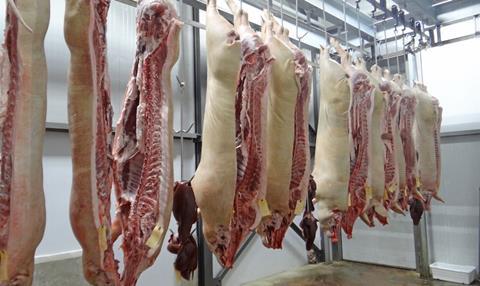A seven-year legal case brought against the Food Standards Agency (FSA) by Cleveland Meat Company Ltd (CMC) and the Association of Independent Meat Suppliers (AIMS) has been dismissed by the Supreme Court.

However, AIMS alleged that a statement made about the case by the FSA concerning the right of appeal against Official Veterinarians' decisions was "misleading".
Dating back to September 2014, the case concerned a bull that was slaughtered at CMC's abattoir. The animal passed the initial ante-mortem inspection by an FSA Official Veterinarian (OV), but at the post-mortem inspection a Meat Hygiene Inspector (MHI) found the carcase had three abscesses that indicated a form of blood poisoning (pyaemia). Subsequently, the OV declared that the carcase was unfit for human consumption.
Having sought a second opinion from a vet who came to a different conclusion, CMC and AIMS stated that there should be a right of appeal against OVs' decisions to ensure judicial protection for businesses. Their suggestion that the OV should serve a Food Detention Notice under section 9 of the Food Safety Act 1990 was refused.
Right of appeal
CMC made an application for judicial review before the High Court to challenge the FSA's assertion that it was not required to use the Food Safety Act 1990 procedure or alternatively provide an appeal right.
After the application was dismissed by the High Court and Court of Appeal, the Supreme Court ruled - after referring questions to the Court of Justice of the European Union - that the section 9 Food Safety Act 1990 procedure was not compatible with the requirements of EU law.
The Court also stated that while there must be a right of appeal, a judicial review was compatible and provided an effective safeguard for legal redress in such circumstances.
In a statement, the FSA said the Court had "found that the claim was without merit and therefore dismissed the appeal."
The FSA quoted Lady Hale and Lord Sales as saying, when passing judgement, there had been "no legal foundation" for CMC's claim that the FSA had acted unlawfully by declining to proceed under the section 9 procedure, nor that the UK had failed to provide an alternative means to challenge decisions taken by an OV.
The statement from the FSA continued: '[Lady Hale and Lord Sales] went on to say: "The case further makes clear that the final decision on the fitness of a carcase for human consumption must be that of the Official Veterinarian."'
"Vital role in making important decisions"
Simon Tunnicliffe, acting director of operations at the FSA, said the agency welcomed the Supreme Court's decision "which confirms OVs are to make the final decision on whether or not meat is fit for human consumption."
He continued: "Our frontline OVs play a vital role in making important decisions every day which help protect customers and ensure food is safe and what it says it is. We have support in place for our OVs to discuss complex cases before they make their final decision if needed."
"Misleading" statement
AIMS alleged that the FSA's news release on the case was "misleading". Peter Hewson, technical director at AIMS, said: "[The FSA] correctly reports that an appeal brought by AIMS against the agency’s refusal to allow an OV’s decision to be appealed has been dismissed by the Supreme Court, but is incorrect in saying that the Court found that: 'The case further makes clear that the final decision on the fitness of a carcase for human consumption must be that of the Official Veterinarian.'
"The European Court of Justice dismissed that argument, in answering the questions put to it by the Supreme Court, finding that there must be a right of appeal against an OV’s decision, but also finding that Section 9 of the Food Safety Act did not provide for an operator to 'bring an action on its own initiative'.
"The Supreme Court came to the view that judicial review would provide the required right of appeal.
"In the case of the Cleveland Bull, the FSA failed in its legal obligation to inform the operator that he had a right of appeal, and even refused to allow for a second opinion. The law has now been clarified that there must be a right of appeal against decisions taken by OVs and has been amended to require the OV to facilitate a second opinion."
The part of the FSA's statement that was disputed by AIMS has now been removed from the FSA's website.
This story was originally published on a previous version of the Meat Management website and so there may be some missing images and formatting issues.












